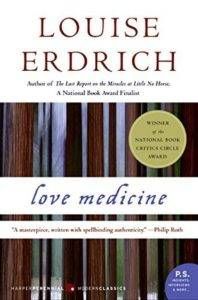Love Medicine’s power and beauty in its telling of two North Dakota Chippewa families spanning several generations has made me a devoted reader of Louise Erdrich‘s for these past 35 years. Erdrich’s storytelling strength comes from her sense of place as being of primary significance—how a landscape and its cultural and political history shapes its people—a literary technique perfected by Toni Morrison and William Faulkner that critics and writers recognized in Love Medicine. Erdrich’s Love Medicine is told in comic and tragic voices—strong characters confronting their destinies with too much passion—that keeps me returning to the book. With each new reading, the stories take on a fresher meaning. I always find undiscovered bits of wisdom within Erdrich’s multi layered writing: “Like now. Take the love medicine. I don’t know where she remembered that from. It came tumbling from her mind like an asteroid off the corner of the screen. But when she mentions them love medicines, I feel my back prickle at the danger. These love medicines is something of an old Chippewa specialty. No other tribe has got them down so well. But love medicines is not for the layman to handle. Before you get one, even, you should go through one hell of a lot of mental condensation. You could really mess up your life grinding up the wrong little thing.” —”Love Medicine” “Society is like this card game here, cousin. We got dealt our hand before we were even born, and as we grow we have to play as best as we can.” “You see I thought love got easier over the years so it didn’t hurt so bad when it hurt, or feel so good when it felt good. I thought it smoothed out and old people hardly noticed it. I thought it curled up and died, I guess. I thought it curled up and died, I guess. Now I saw it rear up and lash. She loved him. She was jealous. She mourned him like the dead. And he just smiled into the air, trapped in the seams of his mind.” —”Love Medicine” “I did what came into my mind. I heard Nanpush. The greatest wisdom doesn’t know itself. The richest plan is not to have one.” —”The Island” “I had gotten humble in the past week, not just losing the touch but getting jolted into the understanding that would prey on me from here on out. Your life feels different on you, once you greet death and understand your heart’s position. You wear your life like a garment from the mission bundle sale ever after—lightly because you realize you never paid nothing for it, cherishing because you know you won’t ever come by such a bargain again. Also, you have the feeling someone wore it before you and someone will after.” —”Love Medicine” My uncle knew my strength lay in which I didn’t know yet, just as, after I went to the island, it would lie in knowing more than I should, more than other people would like. Nothing would look the same after loving Moses Pillager. Right and wrong were shades of meaning, mot sides of a point.” —”The Island” “Now as you know, as I have told you, I am sometimes blessed with the talent to touch the sick and heal their individual problems without even knowing what they are. I have some powers which, now that I think of it, was likely come down from Old Man Pillager. And then there is the newfound fact of insight I inherited from Lulu, as well as the familiar teachings of Grandma Kashpaw on visioning what comes to pass within a lump of tinfoil. It was all these connecting threads of power, you see, that gave me the flash of vision when I was knocked in the skull by Ira’s favorite brand. No concrete shitbarn prison’s built that can hold a Chippewa, I thought. And I realized instantly that was a direct, locally known quote of my father, Gerry Nanapush, famous politicking hero, dangerous armed criminal, judo expert, escape artist, charismatic member of the American Indian Movement, and smoke of many pipes of kinnikinnick in the most radical groups. That was…Dad. According to my vision, he would make a break for freedom soon.” —”Crossing the Water”
